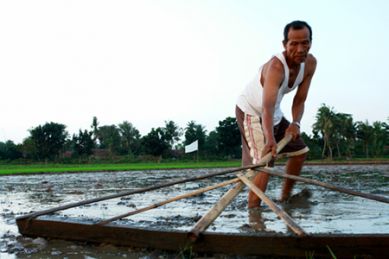Ecumenicals Focus on Water and Just Peace for Lent

Ecumenicals around the globe will be spending their Lenten season praying for the 800 million people who do not have access to clean water and for building a just peace where there are conflicts around the issue.
The campaign, called Seven Weeks for Water: Water, Conflict and Just Peace, was launched this week by the Ecumenical Water Network (EWN) and is being sponsored by the World Council of Churches (WCC), an association representing some 560 million Christians worldwide.
The campaign will feature notes and Biblical reflections about water posted on the internet week by week along with complementary links and ideas for activities for individuals and congregations.
"The theme has been chosen because of its relevance to communities and churches around the world," shared EWN coordinator Maike Gorsboth. "At the same time, the Seven Weeks are a chance for groups and individuals to prepare themselves for the call to just peace that will emanate from the International Ecumenical Peace Convocation that will be taking place in Kingston, Jamaica in May."
"Land and Water," is the theme for the first week's study, which focuses on the injustice often faced by impoverished communities who are forced off their land by wealthy developers.
"Today, many developed countries invest in land abroad to support their growing populations. Local communities get pushed off their lands without consultation," the website says. "Control over the land often goes hand in hand with control over water resources."
"Land and water grabbing are a threat to livelihoods of small-scale peasants, pastoralists and indigenous people," it adds.
Meanwhile, prominent ecumenical leaders have spotlighted the issue of water justice in their recent work, including Church World Service (CWS) CEO the Rev. John McCullough who testified of the "extraordinary meaning and power of water" at a meeting of the Tom Lantos Human Rights Commission earlier this month.
During the meeting, which was held to explore the impact of recent UN resolutions declaring the right to safe drinking water and sanitation as a universal human right, McCullough called the lack of such rights for one-eighth of the world's people as something "repugnant to our sense of justice and fairness in human society," while adding that the crisis is one that can be corrected.
With the right programs, even the world's poorest communities can develop and maintain their own sustainable clean water and sanitation resources, he said.
Current statistics show that 884 million people worldwide do not have access to safe water, 2.6 billion people do not have access to adequate sanitation, and 1.4 million children die every year from water-borne diseases.
A statement issued by the WCC Central Committee in February encouraged all governments to "incorporate the right to water and sanitation into national legislation and policies, making it enforceable at the national level, and to ensure access to appropriate legal remedies in all cases of violation," while challenging governments that have "not yet adopted the principle that access to water and sanitation are legally binding human rights to do so."
On the web:
http://www.oikoumene.org/en/activities/ewn-home.html